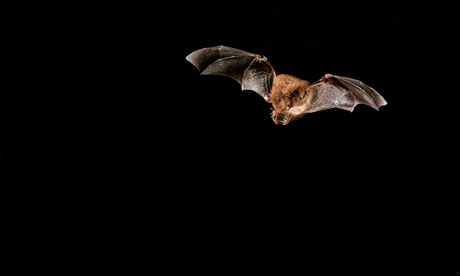
I'm at Duke House, a rare boutique B&B in the heart of Cambridge, and the owners, the irrepressible Liz and Rob Cameron, are about to take me on a bat safari. They've only been running the B&B since Easter. Liz used to be a teacher: "But I didn't feel committed and was crap at it," so they decided to open their home to strangers instead. They're clearly doing a good job as they're already listed in the top three B&Bs in Cambridge. "We're on the podium," says Rob, with a grin.
They're great company and I'm looking forward to our evening out. We're going up the river Cam on Behemoth punts, grander than average, and shall be striking away from the city towards the village of Grantchester. Our punter is Saad Tahir: he's a second year economics student and his slight frame has me wondering whether he's going to manage to shove the Behemoth anywhere, let alone to Grantchester. "I fell in on my test day," he tells me, hands clasped politely behind his back. "But it was very windy, and raining."
I stare at him.
"I didn't fall in on the re-test though," he adds, quickly.
As dusk is drawing in, Saad shoves us off. It's a fine evening but blankets and umbrellas are provided in case it turns chilly or wet, and we're each handed a bat detector. It's a bit like an old-fashioned handheld transistor radio that converts sonar signals into audible frequencies.
Different species of bat operate at varying frequencies and a trained ear is able to distinguish each bat's call. There's no hope of me being able to do this but, thankfully, we have a member of the Wildlife Trusts on board who is able to do all the explaining.
"Bats," Deborah Marchant, our expert guide, tell us, "are vital to the ecosystem. They control crop pests, they pollinate flowers and they drop fruit seeds. If you've ever used balsa wood or chewed gum or drunk tequila," she adds, "then you can thank bats. If you've got drunk on tequila, that's your own fault."
Turns out it's the International Year of the Bat and this safari is part of a drive to raise awareness of a much maligned, misunderstood and often persecuted small mammal. It's news to nobody that bats have a terrible reputation. We have Bram Stoker to thank for that, along with their endless association with witches and other murky things of the night but the truth of the matter is, all bats in the UK are interested in is eating vast quantities of insects.
"They need to consume 3,000 insects a night just to stay alive," Deborah tells us. "This summer has been terrible for them. It's not been warm enough to generate enough insects. We've had a lot of dehydrated, exhausted bats. You often find them on the floor. They're disorientated. If you find one, you can call the Bat Conservation Trust. They'll come and save them."
Suddenly, there's a loud chatter on Rob's bat sensor. It's a rapid clicking noise and we all crane round to see a fast-darting black smudge sweep across our field of vision. "That's a Daubenton," Deborah tells us. "They can live for 22 years."
As it gets darker and the water below us turns the colour of treacle, our bat sensors come alive. Deborah leans forward and shines a torch out across the water and as she does so, the river surface becomes animated with thousands of flying insects. It's wonderfully gothic: gnarled branches of low hanging trees dripping over the shore line, bats diving all around and the single beam of light stretching off into the darkness.
"This is how horror films start," I mumble to Rob as we silently glide past dense undergrowth. "I keep expecting a face to suddenly appear. And then disappear. And then reappear but with an idiosyncratic killing tool."
"First rule of horror films – don't split up. We'll be fine," says Rob, reassuringly.
"Watch out, Saad," says the punter to our left. "Dead Man's Corner coming up."
"Don't worry," says Rob, turning to me, "it's only called that because of all the dead men."
"Oh look," says Liz, pointing, as we round the corner. "That's something you don't see every day." There's a cow standing on the towpath and he's eating out of a bin. It's like a secret insight into what cows get up to at night.
"Vampire cows," I whisper and then make a mental note to turn that into a film idea immediately.
The bat safari lasts around 90 minutes and despite being eaten alive by insects (top tip: take insect repellent) it's a gloriously peaceful and relaxing way to spend an evening. Children will love it too, especially the bat sensors, so all in all, a top-notch family outing.
Now then. Vampire Cows. I'm thinking George Clooney? Who's in?
• You can book a bat safari at scudamores.com. The safaris run every Friday until 21 September. Adult tickets cost £15. Concession tickets are £13.50, while for under 12s the price is £7.50
If you would like to stay with Rob and Liz at Duke House boutique B&B then you can book via its website, dukehousecambridge.co.uk.
Emma had a very fine supper at Fitzbillies and can thoroughly recommend its Chelsea Bun ice-cream.
Follow Emma Kennedy on Twitter @EmmaK67

